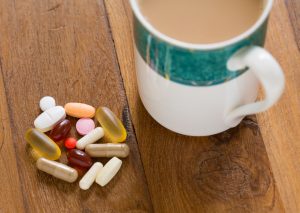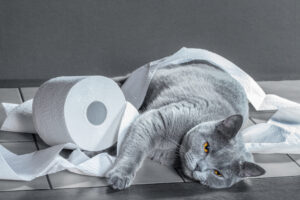What's On This Page?
ToggleEver looked into the toilet and felt your eyes widen when greeted by green poop? Don’t panic! This is one of the most commonly googled questions on the Internet. While a surprise to your daily routine, green stool is typically not a sign of something scary like salmonella (though, yes, it can happen!). There are several causes, and most of them are harmless. I’ll walk you through five potential reasons for the colorful change—and what you can do about it. Let’s dig in as to why your stool color might be this color!
1. Dietary Choices
The most common culprit behind green poop is your diet—yep, what goes in does affect what comes out (sorry, no magic here). A couple of green-hued suspects include:
- Leafy Greens: Ever had a giant kale or spinach salad? If so, this is probably the reason. These nutrient-rich greens are packed with chlorophyll, which can turn your stool green. While raw greens are a popular choice for smoothies or salads, they can have other side effects, such as impacting thyroid hormone levels. My advice? Mix it up with cooked veggies now and then. If you’re interested in the thyroid connection, check out my blog The Case Against Kale: As it Pertains to Your Thyroid for a deeper dive.
- Artificial Green Food Coloring: Your poop can resemble a carnival after you’ve indulged in artificially colored foods or drinks (think neon-colored candies, ice cream, or soda). One common culprit is FD&C Green No. 3, also known as “fast green,” or E142. These dyes may not add much to your health but sure do add color to your stool! Read more on food dyes with my other article, The Concerns Behind These 3 Artificial Food Colorings.
What You Can Do: If you suspect your diet, try cutting back on those leafy greens or green-dyed treats and see if things return to normal. Don’t worry; you won’t need to give up kale forever (just maybe for a meal or two!).
2. Bile Pigment and Its Fast Exit
Your liver produces BILE, a digestive fluid that breaks down fats, and it starts off green! Normally, as bile travels through your intestines, it turns brown—hence the usual brown color of stool. But when food zips through your digestive tract too quickly (due to diarrhea, for example), bile doesn’t get fully broken down, and your poop may stay green.
This is common if you’re dealing with IBS (Irritable Bowel Syndrome) or any condition that causes rapid transit through the gut. Even antibiotics or iron supplements can speed up bile movement and contribute to the greenish tint.
What You Can Do: Addressing the root cause of diarrhea is key. Whether it’s a viral infection, food poisoning, or a chronic issue like IBS, managing these will help. Staying hydrated with clear fluids and eating bland foods can support your digestive system as it rebalances itself. If your bile isn’t behaving normally, I’ve written more about liver health in my blog, The Art of Detoxification: 8 Ways to Cleanse Your Body Naturally.

3. Supplements and Medications
Many people overlook their supplement regimen when investigating why their poop has changed color. Here are two notable offenders:
- Iron Supplements: If you’re taking iron, you may have noticed the color of your stool changing to green or even black. Don’t worry; this is a known side effect and quite common, especially in people who are treating iron-deficiency anemia, heavy periods, or during pregnancy. There are interactions with iron and medications. Read my article, Avoid Dangerous Interactions From Supplements.
- Antibiotics: These can disrupt your gut flora (the good bacteria), which can change how your stool looks. When antibiotics wipe out bacteria, they also interrupt how your gut processes bile, which can result in green stool. Read 7 Natural Alternatives to Antibiotics.
What You Can Do: Keep track of how long you’ve been taking iron or antibiotics. Iron is typically prescribed for about 30-90 days, and antibiotics are usually given for 7-14 days. It’s worth checking in with your healthcare provider if you’ve been on these longer than necessary or if your symptoms persist. Remember, pharmacists are a great resource for helping to identify whether medications are contributing to this green surprise.
4. Infections
Green poop can sometimes indicate a bacterial or viral infection. Along with green stool, you might experience symptoms like diarrhea, fever, or abdominal cramps.
- Bacterial Infections: Certain bacteria such as Salmonella or E. coli can cause your stool to turn green, especially during bouts of diarrhea. This happens because the infection accelerates food’s journey through your digestive tract.
- Viral Infections: Viral illnesses like rotavirus or norovirus (especially in children) can lead to greenish stools. Green poop here is a sign that your body is processing the infection quickly. I have a great supplement for immune and allergy support* called Immune Script. See information below.
If you’re prone to infections or have an autoimmune disorder, consider reading my article on this topic which highlights information on lactoferrin (I do not sell that supplement however it’s available online and at some health food stores): Embracing Lactoferrin: A Guide To 13 Natural Tactics For Autoimmune Relief.
What You Can Do: If you think an infection is at play, rest and hydration are your best friends. Most viral and bacterial infections resolve on their own, but if you’re experiencing severe or persistent symptoms, it’s time to see a doctor. And yes, stay home to avoid spreading it!
5. Digestive Disorders
Finally, green stool can sometimes signal an underlying digestive issue, especially if it’s accompanied by other symptoms like pain or bloating.
- Irritable Bowel Syndrome (IBS): This condition causes changes in stool consistency and color, including green stools during flare-ups.
- Celiac Disease: If you’re sensitive to gluten, you may notice green poop among other signs of malabsorption.
What You Can Do: Managing these conditions requires a thoughtful approach, often including dietary changes and sometimes medications. See a healthcare provider if you suspect a chronic digestive disorder. They can offer the right tests, diagnosis, and treatment plan.

Final Thoughts on Green Poop
Finding this color of excrement in the toilet might be unsettling, but it’s usually not a sign of something dangerous. From your diet to how fast your body is processing bile, many factors can turn things green, most of them relatively harmless. However, if the green color sticks around for several days or is paired with symptoms like severe pain, persistent diarrhea, or fever, it’s smart to consult a healthcare provider.
Remember, your digestive system is an intricate network, and even small changes in your routine—diet, medication, or supplements—can have a noticeable impact. Keep an eye on your food choices, stay hydrated, and don’t hesitate to seek medical advice when needed.
And next time your poop turns green, you’ll know where to look first!

Suzy Cohen, has been a licensed pharmacist for over 30 years and believes the best approach to chronic illness is a combination of natural medicine and conventional. She founded her own dietary supplement company specializing in custom-formulas, some of which have patents. With a special focus on functional medicine, thyroid health and drug nutrient depletion, Suzy is the author of several related books including Thyroid Healthy, Drug Muggers, Diabetes Without Drugs, and a nationally syndicated column.


